西奥多 罗特克共27页文档
西奥多罗斯福-PPT文档资料
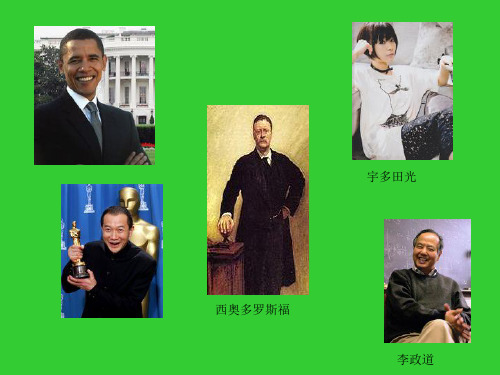
location
• Manhattan, NewYork • As we know, NewYork is the most famous city in the world, and we can also say that, Manhattan is the symbol of NewYork.The famous tourist attractions include uptown's Central park, Madison Avenue,Broadway,Greenwich village,and located in downtown free island——statue of libe1、课程是严谨的。从细心装订、印发的讲 义,学生意愿调查来看,程序很严谨。当 然,讲义的印刷,是由系里的教学秘书负 责的,因为我中午在的时候,她一直在复 印机前,虽然不是在为这门课准备,但可 以看到她在开学时的工作任务是很重的。 从讲义的内容,尤其是课程大纲,每一节 课的教学内容来看,这是很细致的一份工 作。
• 2、内容是充实的。以前有人说美国的课就 是形式好看,不停地讨论,但事实上讨论 的都是是最基本的内容。从这堂课来看, 不是这样的,因为在哲理诗基础上的讨论 ,一下子提到了一个很高的境界和水平。 老师在开场时讲的那么长,居然把两个学 生讲跑了,让他们放弃了这门课。以后每 次课前都要完成读书心得,这样,讨论就 会在一个很高的水平上进行,在大家有问 题的地方集中。
location
• In 1897, the university moved from Fortyninth Street and Madison Avenue, where it had stood for fifty years, to its present location on Morningside Heights at 116th Street and Broadway.
《保罗·策兰诗选》译后记

《保罗·策兰诗选》译后记杨子评论Comments2012年,我的三首短诗和策兰那首大名鼎鼎的《死亡赋格》英文版一同发表在美国加州大学英语系《Arroyo文学评论》杂志春季号“翻译”版块———这期只有我们两个外国诗人。
我知道这只是一次巧合,没有任何命定的意味。
只能说,得益于我诗歌的三位英译者———叶春、Melissa Tuckey和Fiona Sze-Lorrain出色的翻译,《Arroyo文学评论》抬举了我一回,让我做梦般和我热爱的这位诗人邂逅。
实际上这也是两位策兰译者的一次邂逅:早在2003年我就初译了一百三十多首策兰诗歌,而这期《Arroyo 文学评论》上《死亡赋格》的英译者恰恰是约翰·费尔斯蒂纳(John Felstiner),英语世界著名的策兰诗文译者和策兰传记作者,我的这部《策兰诗选》最需感谢的人就是他———一些作品转译自他的英译或借助他的英译解决了疑难,而他的《保罗·策兰传》(李尼译)更是我翻译过程中一部重要的参考书,也可以说是一根重要的拐杖。
精神上我似乎可与策兰息息相通绝无窒碍———他倾注大量心血翻译的诗人恰好都是我所热爱的———从叶赛宁、曼德尔施塔姆到阿波利奈尔和勒内·夏尔。
他引为精神上的兄弟的曼德尔施塔姆更是我经常想起的诗人———巧合的是,策兰是德语世界第一位曼德尔施塔姆诗选译者,我是中文世界第一部较全面的曼德尔施塔姆诗选译者(第一部曼德尔施塔姆诗选中文译者是智量先生,遗憾的是他翻译得太少),尽管那部译诗集我一直不满意,但曼德尔施塔姆的声音在策兰那儿有着怎样的回响,我已经能直觉到,也能找到部分直接的凭证。
但这绝不意味着我在翻译策兰时会有什么优势。
实际上没有谁敢说自己与策兰息息相通,可以绝对领会他诗中深藏的含义———那种既是声音的、又是空间的,既是历史的、又是当下的,既是政治的、又用卓绝诗艺摒除政治痕迹的,既有刹那的一口气、又蕴含广袤之永恒的,并且时常浮现出六边形大卫之星和意第绪语与希伯来语的伟大诗篇。
Lecture 24 on R.Lowell& E. Bishop & T.Roethke 2
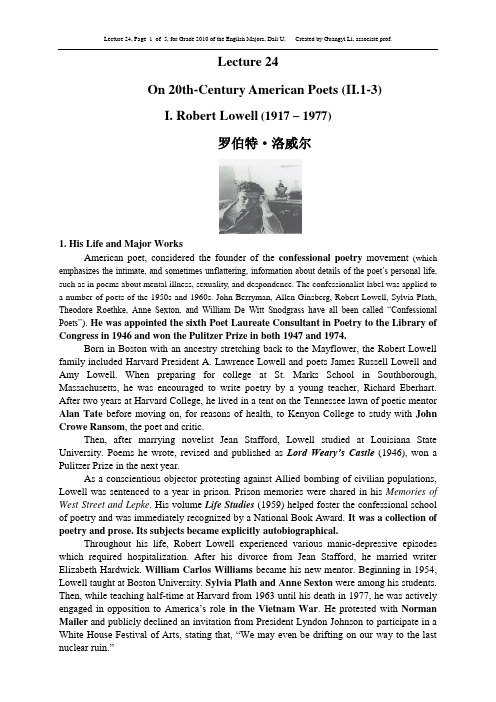
Lecture 24On 20th-Century American Poets (II.1-3)I. Robert Lowell(1917 – 1977)罗伯特·洛威尔1. His Life and Major WorksAmerican poet, considered the founder of the confessional poetry movement (which emphasizes the intimate, and sometimes unflattering, information about details of the poet’s personal life, such as in poems about mental illness, sexuality, and despondence. The confessionalist label was applied to a number of poets of the 1950s and 1960s. John Berryman, Allen Ginsberg, Robert Lowell, Sylvia Plath, Theodore Roethke, Anne Sexton, and William De Witt Snodgrass have all been called “Confessional Poets”). He was appointed the sixth Poet Laureate Consultant in Poetry to the Library of Congress in 1946 and won the Pulitzer Prize in both 1947 and 1974.Born in Boston with an ancestry stretching back to the Mayflower, the Robert Lowell family included Harvard President A. Lawrence Lowell and poets James Russell Lowell and Amy Lowell. When preparing for college at St. Marks School in Southborough, Massachusetts, he was encouraged to write poetry by a young teacher, Richard Eberhart. After two years at Harvard College, he lived in a tent on the Tennessee lawn of poetic mentor Alan Tate before moving on, for reasons of health, to Kenyon College to study with John Crowe Ransom, the poet and critic.Then, after marrying novelist Jean Stafford, Lowell studied at Louisiana State University. Poems he wrote, revised and published as Lord Weary’s Castle(1946), won a Pulitzer Prize in the next year.As a conscientious objector protesting against Allied bombing of civilian populations, Lowell was sentenced to a year in prison. Prison memories were shared in his Memories of West Street and Lepke. His volume Life Studies(1959) helped foster the confessional school of poetry and was immediately recognized by a National Book Award. It was a collection of poetry and prose. Its subjects became explicitly autobiographical.Throughout his life, Robert Lowell experienced various manic-depressive episodes which required hospitalization. After his divorce from Jean Stafford, he married writer Elizabeth Hardwick. William Carlos Williams became his new mentor. Beginning in 1954, Lowell taught at Boston University. Sylvia Plath and Anne Sexton were among his students. Then, while teaching half-time at Harvard from 1963 until his death in 1977, he was actively engaged in opposition to America’s role in the Vietnam War. He protested with Norman Mailer and publicly declined an invitation from President Lyndon Johnson to participate in a White House Festival of Arts, stating that, “We may even be drifting on our way to the last nuclear ruin.”Finally, the last work in Lowell’s sonnet sequence, The Dolphin, which won the 1974 Pulitzer Prize, includes poems about his daughter, his ex-wife, and his new wife Caroline Blackwood whom he’d affectionately nicknamed “Dolphin.”Lowell’s sudden death at the age of sixty by heart attack, occurred in a taxi when he was returning to his second wife, Elizabeth Hardwick, after breaking from his third wife, Lady Caroline Blackwood.Robert Lowell was a Chancellor of the Academy of American Poets from 1962 until his death in 1977. He was personally acquainted with most of the major poets of his time and much respected by T. S. Eliot. His Life Studies has been compared to Walt Whitman’s Song of Myself and Eliot’s The Waste Land as a turning point in American Poetry.Lowell’s Collected Poems, edited by Frank Bidart and David Gewanter, were published in 2003. The Letters of Robert Lowell, edited by Saskia Hamilton, was published in 2005. Both volumes received overwhelmingly positive critical responses from the mainstream press, and their publication has since led to a renewed interest in Lowell’s writing.2. A Brief Analysis of “Skunk Hour”“Skunk Hour” is included in Lowell’s 1959 Life Studies.It epitomizes the poet’s predicament of living out an existential malaise.Nothing lives forever.It’s out of natural instinct for human beings and animals to seek love and food.The speaker longs for love and marriage from his lover.It’s a partial reflection of the society of the USA in the 1950s.3. Suggested Answers to Questions in the textbook1)It’s the time of indulgence in corporal desires to seek love and food.2)No. People are hedonistic in the narrator’s eye. They’re indulged in the pursuit ofmaterial and sexual desires.3)He feels low-spirited and extremely sad and isolated about the decadent life of theyoung peopleII. Elizabeth Bishop (1911 – 1979)1. Her Life and Major WorksElizabeth Bishop was one of the most important and distinguished American poets of the 20th century. She was the Poet Laureate of the United States from 1949 to 1950, a Pulitzer Prize winner in 1956 and a National Book Award Winner for Poetry in 1970. Bish op’s style of writing is particularly known for its objective, distant point of view.Elizabeth Bishop was born in Worcester, Massachusetts in 1911, but spent part of her childhood with her Canadian maternal grandparents after her father’s death and mother’shospitalization. A poet of observation, not of personal relationships, Bishop paints minutia of nature visible on land and sea. Her power to see was not the fruit of a life without pain. Her father died but mere months after her own birth in Worcester, Massachusetts, in 1911. Her mother was confined to a mental hospital when Elizabeth was only five, and she never saw her again. Of her childhood she noted, “My relatives all felt so sorry for this child that they tried to do their very best. And I think they did. I lived with my grandparents in Nova Scotia, then with the ones in Worcester, in Massachusetts, very briefly and got terribly sick. This was when I was six and seven.... Then I lived with my mother’s older sister in Boston, she was devoted to me -- she had no children. My relationship with my relatives -- I was always sort of a guest, and I think I’ve always felt like that.”Bishop was independently wealthy in early adulthood as a result of an inheritance from her deceased father that didn’t run out until the end of her life. With this inheritance, Bishop was able to travel widely without worrying about employment and lived in many cities and countries which are described in her poems.E. Bishop traveled extensively in Europe and lived in New York, Key West, Florida, and, for seventeen years, in Brazil. She taught briefly at the University of Washington, at Harvard for seven years, at New York University, and just prior to her death in 1979, at Massachusetts Institute of Technology.After living with her father’s parents, Bishop met Marianne Moore, who encouraged publication of her early poems written when she studied at Vassar College. Later, when living in New York, she became a close friend of Robert Lowell. Of her work, Robert Lowell remarked, “Elizabeth Bishop is the contemporary poet that I admire most .... There’s a beautiful completeness to all of Bishop’s poetry. I don’t think anyone alive has a better eye than she had: The eye that sees things and the mind behind the eye that remembers.” Then Bishop was a consultant in poetry at the Library of Congress. When she lived in Florida for seven years, Bishop completed her first book of poems, North and South (1955). It won the Pulitzer Prize.Elizabeth Bishop won virtually every poetry prize in the country although she insisted, “They don’t mean too much.” Her first book,North & South, won the Houghton Mifflin Poetry Award for 1946. In 1955, she received the Pulitzer Prize for a volume containing North & South and A Cold Spring. Her next book of poetry, Questions of Travel(1965), won the National Book Award and was followed by The Complete Poems (1969). Geography III (1976) received the National Book Critics Circle Award. In 1976, Miss Bishop became both the first American and the first woman to win the Books Abroad/Neustadt Prize for LiteratureFollowing her life-steadying lesbian love relation with Lota de Macedo Soares throughout their years together in Bra zil, Bishop returned to America after Lota’s suicide. She became poet-in-residence at Harvard in 1969. Her Complete Poems won the National Book Award in 1970.A new source of strength for the rest of Bishop’s life was her new partner, Alice Methfessel. Elizabeth Bishop taught at Harvard until death in her Boston apartment of a cerebral aneurism (动脉瘤) in 1979.2. Suggested Answers to Questions in the textbook1)In three more days, she would be seven years old.2)Yes. Her aunt gave out a painful cry in the den tist’s room while at that time WW Iwas still going on, with heavy casualties and destruction occurring in the world. Incomparison with those cries of deadly pain on the battlefield, it was not very loud or long.3)On National Geographic of February 1918, as the narrator looks at those pictures ofa live volcano, explorers, a dead man slung on the pole with the caption of “LongPig” under it, babies of pointed heads, black, naked women with necks wound with wire and with horrifying breasts, she utters an exclamation of surprise.4)Because they’re all human beings, with so many similarities both physical andemotional.5)Herself.6)Because she feels herself daydreaming—as if she were falling off the earth into cold,blue-black space.7)The dark night might symbolize the savage war—WWI, which still went on in theworld then.III. Theodore Roethke(pronounced RET-kə)西奥多·罗特克(1908 – 1963)1. His Life and Major WorksTheodore Roethke was an American poet, who published several volumes of poetry characterized by its rhythm and natural imagery. He was awarded the Pulitzer Prize for poetry in 1954 for his book, The Waking.Theodore Roethke was born in Saginaw(萨吉诺), Michigan, in 1908. As a child, he spent much time in the greenhouse owned by his German grandfather and father and uncle for a living. His impressions of the natural world contained there would later profoundly influence the subjects and imagery of his verse. “I was born under a glass heel and have always lived there,”he was to remark. He was haunted not only by the ordered, protected world of the paternal greenhouse and its cultivated flowers, but also by the desolate landscape of that part of Michigan. “The marsh, the mire, the Void, is always there, immediate and terrifying. It is a splendid place for schooling the spirit. It is American.”His poetry often re-enacted this “schooling” of the spirit by revisiting the landscapes of his childhood: the nature poems which make up the largest part of his early work try to bridge the distance between a child’s consciousness and the adult mysterious presided over by his father. Roethke arranged and rearranged these poems to give the sense of a spiritual autobiography, especially in preparing the volumes The Lost Son (1948), Praise to the End! (1951), and The Waking (1953).Roethke graduated magna cum laude(以优等成绩)from the University of Michigan in 1929. He later took a few graduate classes at Michigan and Harvard, but was unhappy in school. His first book, Open House(1941), took ten years to write and was critically acclaimed upon its publication. He went on to publish sparingly but his reputation grew with each new collection, including The Waking(1953) which was awarded the Pulitzer Prize in 1954.His later love poems show him in periods of release and monetary pleasure. Many of them included in Words of the Wind (1958), which won posthumously a National Book Award and Bollingen Prize and The Far Field (1964), which won posthumously a National Book Award, are among the most appealing in recent American verse.He admired the writing of such poets as Emerson, Thoreau, Whitman, Blake, and Wordsworth, as well as Yeats and Dylan Thomas. Stylistically his work ranged from witty poems in strict meter and regular stanzas to free verse poems full of mystical and surrealistic imagery. At all times, however, the natural world in all its mystery, beauty, fierceness, and sensuality, is close by, and the poems are possessed of an intense lyricism. Roethke had close literary friendships with fellow poets W. H. Auden, Louise Bogan, Stanley Kunitz, and William Carlos Williams. He taught at various colleges and universities, including Lafayette, Pennsylvania State, and Bennington, and worked last at the University of Washington, where he was mentor to a generation of Northwest poets that included David Wagoner, Carolyn Kizer, and Richard Hugo. Theodore Roethke died of heart failure in 1963.2. A Brief Analysis of “The Waking”The waking in the poem is pun, which, besides its literal meaning, refers metaphorically to a gradual understanding of oneself and the world.Theme: Life is like a journey. We learn by doing and feeling. It takes time for us to become wise.3. Suggested Answers to Questions in the textbook1)Although I wake up in the morning, there are always things which puzzle me, whichmake me feel that I seem to be still asleep.2)Great Nature is the teacher of the speaker and the reader. He reveals that life is ajourney in which one becomes wise gradually while pursuing his or her goal.3)It may mean that time flies, and there will always be tomorrow. Changes in life areconstant4. Assignments1)Who was Allen Ginsberg and what are his major works?2)Who was Sylvia Plath and what are her major works?3)Who was Robert Hayden and what are his major works?4)Try to answer the questions below each poem.。
屈原后期的心境障碍及其沉江结局
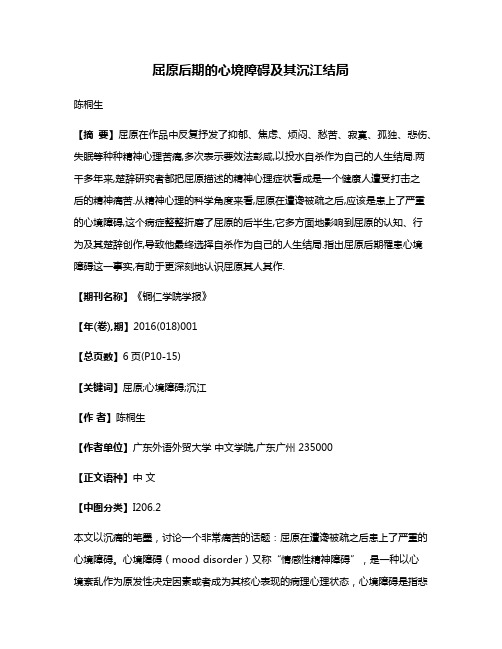
屈原后期的心境障碍及其沉江结局陈桐生【摘要】屈原在作品中反复抒发了抑郁、焦虑、烦闷、愁苦、寂寞、孤独、悲伤、失眠等种种精神心理苦痛,多次表示要效法彭咸,以投水自杀作为自己的人生结局.两千多年来,楚辞研究者都把屈原描述的精神心理症状看成是一个健康人遭受打击之后的精神痛苦.从精神心理的科学角度来看,屈原在遭谗被疏之后,应该是患上了严重的心境障碍,这个病症整整折磨了屈原的后半生,它多方面地影响到屈原的认知、行为及其楚辞创作,导致他最终选择自杀作为自己的人生结局.指出屈原后期罹患心境障碍这一事实,有助于更深刻地认识屈原其人其作.【期刊名称】《铜仁学院学报》【年(卷),期】2016(018)001【总页数】6页(P10-15)【关键词】屈原;心境障碍;沉江【作者】陈桐生【作者单位】广东外语外贸大学中文学院,广东广州 235000【正文语种】中文【中图分类】I206.2本文以沉痛的笔墨,讨论一个非常痛苦的话题:屈原在遭谗被疏之后患上了严重的心境障碍。
心境障碍(mood disorder)又称“情感性精神障碍”,是一种以心境紊乱作为原发性决定因素或者成为其核心表现的病理心理状态,心境障碍是指悲伤或情绪高涨显得十分强烈且持久,其症状表现超过了对生活事件应激反应的程度。
心境障碍有双相(抑郁、躁狂)及单相(抑郁)两种。
这个病症多方面地影响到屈原的情感、认知、行为及其楚辞创作,并导致他最终选择自杀作为自己的人生结局。
楚辞作品中有大量描写屈原心情抑郁、焦虑、愁苦、悲伤、烦闷的诗句,但从司马迁写《史记·屈原贾生列传》起,历代楚辞学者都是以健康人的目光来看待屈原,他们把楚辞中那些描述屈原郁闷、愁苦、悲伤、焦虑症状的诗句看成是健康人遭受挫折之后的精神痛苦,将屈原的自杀简单地理解为以身殉国的理性行为。
古今学者这样解读屈原是可以理解的,因为中国传统医学中没有心境障碍这一概念,古人的心境障碍在巫师那里被看作是邪魔缠身,中医则将其诊断为肝火扰心。
每日一诗·“思与诗”--西方哲理诗系列
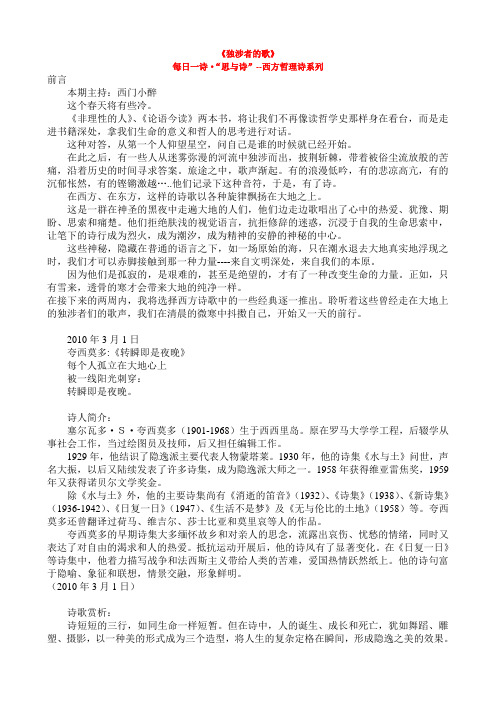
《独涉者的歌》每日一诗·“思与诗”--西方哲理诗系列前言本期主持:西门小醉这个春天将有些冷。
《非理性的人》、《论语今读》两本书,将让我们不再像读哲学史那样身在看台,而是走进书籍深处,拿我们生命的意义和哲人的思考进行对话。
这种对答,从第一个人仰望星空,问自己是谁的时候就已经开始。
在此之后,有一些人从迷雾弥漫的河流中独涉而出,披荆斩棘,带着被俗尘流放般的苦痛,沿着历史的时间寻求答案。
旅途之中,歌声渐起。
有的浪漫低吟,有的悲凉高亢,有的沉郁怅然,有的铿锵激越…..他们记录下这种音符,于是,有了诗。
在西方、在东方,这样的诗歌以各种旋律飘扬在大地之上。
这是一群在神圣的黑夜中走遍大地的人们,他们边走边歌唱出了心中的热爱、犹豫、期盼、思索和痛楚。
他们拒绝肤浅的视觉语言,抗拒修辞的迷惑,沉浸于自我的生命思索中,让笔下的诗行成为烈火,成为潮汐,成为精神的安静的神秘的中心。
这些神秘,隐藏在普通的语言之下,如一场原始的海,只在潮水退去大地真实地浮现之时,我们才可以赤脚接触到那一种力量----来自文明深处,来自我们的本原。
因为他们是孤寂的,是艰难的,甚至是绝望的,才有了一种改变生命的力量。
正如,只有雪来,透骨的寒才会带来大地的纯净一样。
在接下来的两周内,我将选择西方诗歌中的一些经典逐一推出。
聆听着这些曾经走在大地上的独涉者们的歌声,我们在清晨的微寒中抖擞自己,开始又一天的前行。
2010年3月1日夸西莫多:《转瞬即是夜晚》每个人孤立在大地心上被一线阳光刺穿:转瞬即是夜晚。
诗人简介:塞尔瓦多·S·夸西莫多(1901-1968)生于西西里岛。
原在罗马大学学工程,后辍学从事社会工作,当过绘图员及技师,后又担任编辑工作。
1929年,他结识了隐逸派主要代表人物蒙塔莱。
1930年,他的诗集《水与土》问世,声名大振,以后又陆续发表了许多诗集,成为隐逸派大师之一。
1958年获得维亚雷焦奖,1959年又获得诺贝尔文学奖金。
1945年至1990年的美国诗歌
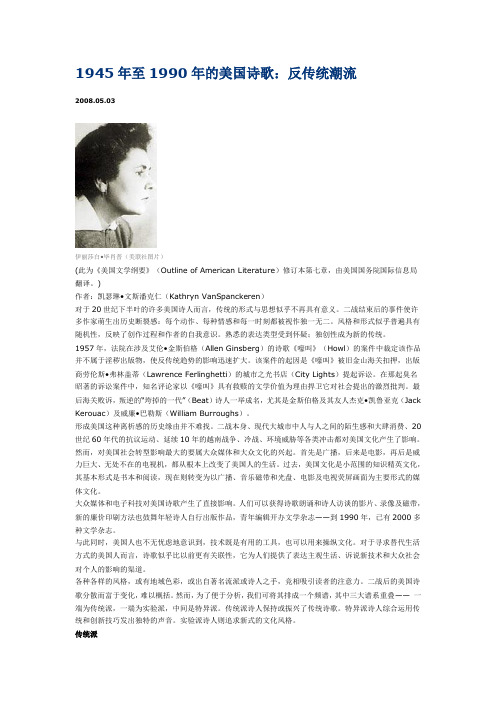
1945年至1990年的美国诗歌:反传统潮流2008.05.03伊丽莎白•毕肖普(美联社图片)(此为《美国文学纲要》(Outline of American Literature)修订本第七章,由美国国务院国际信息局翻译。
)作者:凯瑟琳•文斯潘克仁(Kathryn VanSpanckeren)对于20世纪下半叶的许多美国诗人而言,传统的形式与思想似乎不再具有意义。
二战结束后的事件使许多作家萌生出历史断裂感:每个动作、每种情感和每一时刻都被视作独一无二。
风格和形式似乎普遍具有随机性,反映了创作过程和作者的自我意识。
熟悉的表达类型受到怀疑;独创性成为新的传统。
1957年,法院在涉及艾伦•金斯伯格(Allen Ginsberg)的诗歌《嚎叫》(Howl)的案件中裁定该作品并不属于淫秽出版物,使反传统趋势的影响迅速扩大。
该案件的起因是《嚎叫》被旧金山海关扣押,出版商劳伦斯•弗林盖蒂(Lawrence Ferlinghetti)的城市之光书店(City Lights)提起诉讼。
在那起臭名昭著的诉讼案件中,知名评论家以《嚎叫》具有救赎的文学价值为理由捍卫它对社会提出的激烈批判。
最后海关败诉,叛逆的“垮掉的一代”(Beat)诗人一举成名,尤其是金斯伯格及其友人杰克•凯鲁亚克(Jack Kerouac)及威廉•巴勒斯(William Burroughs)。
形成美国这种离析感的历史缘由并不难找。
二战本身、现代大城市中人与人之间的陌生感和大肆消费、20世纪60年代的抗议运动、延续10年的越南战争、冷战、环境威胁等各类冲击都对美国文化产生了影响。
然而,对美国社会转型影响最大的要属大众媒体和大众文化的兴起。
首先是广播,后来是电影,再后是威力巨大、无处不在的电视机,都从根本上改变了美国人的生活。
过去,美国文化是小范围的知识精英文化,其基本形式是书本和阅读,现在则转变为以广播、音乐磁带和光盘、电影及电视荧屏画面为主要形式的媒体文化。
my papa's waltz
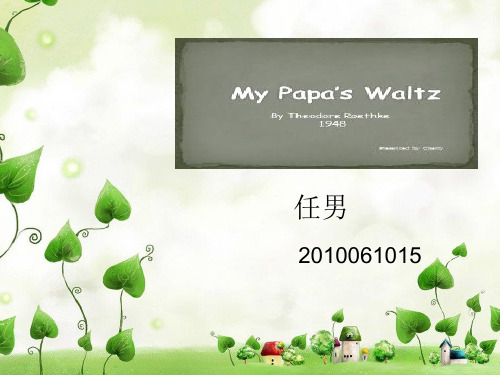
• • • • • • • •
You beat time on my head 你在我头上敲击节拍, With a palm caked hard by dirt, 手掌上干硬的泥土沾满, Then waltzed me off to bed 华尔兹舞步中你送我上床, Still clinging to your shirt. 我的小手紧拽你的衬衫。
• • • • • • • •
We romped until the pans 我们蹦喳喳不停旋转 Slid from the kitchen shelf; 在一旁看得心里发烦。 震落了厨房的锅瓢碗盘, My mother's countenance 我的母亲眉头紧锁, Could not unfrown itself. 在一旁看得心里发烦。
Nationality
Genres Notable work(s) Notable award(s)
United States
American poetry The Waking, The Lost Son, The Far Field, Words for the Wind Pulitzer Prize, National Book Award
My Papa’s Waltz
任男
2010061015
Born
May 25, 1908 Saginaw, Michigan August 1, 1963) (aged 55) Bainbridge Island, Washington Teacher, poet, author
Died Occupation
Hale Waihona Puke • line 4 - "Such waltzing was not easy" The waltz should be easy, on a literal level, because the speaker is just being swung around by his father. It isn’t easy because, apparently, their lives together aren’t easy. • - lines 5-6 - "We romped until the pans / Slid from the kitchen shelf" Continuing the tone of the first stanza, the word romped here is ironic because it makes the waltz sound carefree, yet the effect of this romping is to cause a violent, crashing disruption in their domestic world.
露易斯·格丽克诗歌译记
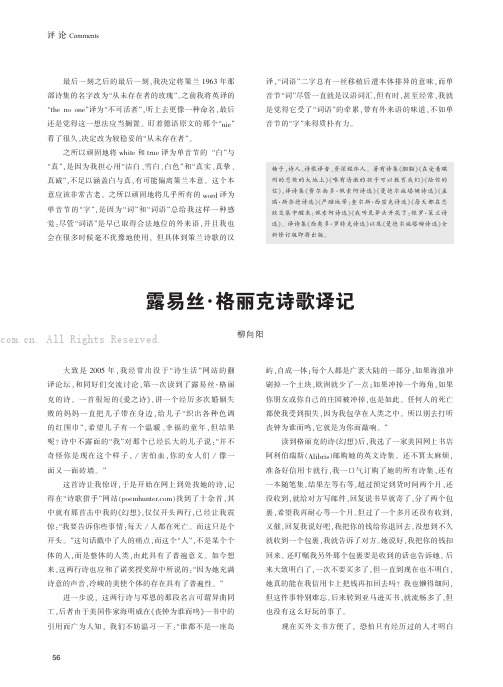
杨子,诗人、诗歌译者、资深媒体人。
著有诗集《胭脂》《在受着磔刑的悲怆的大地上》《唯有清澈的孩子可以教育我们》《给你的信》,译诗集《费尔南多·佩索阿诗选》《曼德尔施塔姆诗选》《盖瑞·斯奈德诗选》《严酷地带:查尔斯·西密克诗选》《每天都在悲欣交集中醒来:佩索阿诗选》《我听见斧头开花了:保罗·策兰诗选》。
译诗集《西奥多·罗特克诗选》以及《曼德尔施塔姆诗选》全新修订版即将出版。
评论Comments露易丝·格丽克诗歌译记柳向阳最后一刻之后的最后一刻,我决定将策兰1963年那部诗集的名字改为“从未存在者的玫瑰”。
之前我将英译的“the no one ”译为“不可活者”,听上去更像一种命名,最后还是觉得这一想法应当搁置。
盯着德语原文的那个“nie ”看了很久,决定改为较稳妥的“从未存在者”。
之所以顽固地将white 和true 译为单音节的“白”与“真”,是因为我担心用“洁白、雪白、白色”和“真实、真挚、真诚”,不足以涵盖白与真,有可能偏离策兰本意。
这个本意应该非常古老。
之所以顽固地将几乎所有的word 译为单音节的“字”,是因为“词”和“词语”总给我这样一种感觉:尽管“词语”是早已取得合法地位的外来语,并且我也会在很多时候毫不犹豫地使用,但具体到策兰诗歌的汉译,“词语”二字总有一丝移植后遭本体排异的意味,而单音节“词”尽管一直就是汉语词汇,但有时,甚至经常,我就是觉得它受了“词语”的牵累,带有外来语的味道,不如单音节的“字”来得质朴有力。
大致是2005年,我经常出没于“诗生活”网站的翻译论坛,和同好们交流讨论,第一次读到了露易丝·格丽克的诗。
一首很短的《爱之诗》,讲一个经历多次婚姻失败的妈妈一直把儿子带在身边,给儿子“织出各种色调的红围巾”,希望儿子有一个温暖、幸福的童年,但结果呢?诗中不露面的“我”对那个已经长大的儿子说:“并不奇怪你是现在这个样子,∕害怕血,你的女人们∕像一面又一面砖墙。
